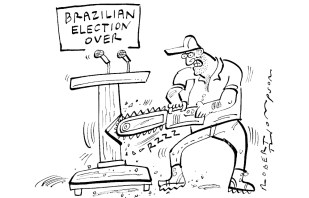One test of how famous a writer has become, I’d suggest, is what jeux d’esprit they’re allowed to publish. By this criterion, Nick Hornby still has some distance to go before he matches Haruki Murakami, who in 2020 gave us Murakami T – a fully illustrated guide to his own T-shirts. Even so, Dickens and Prince is as strange as it sounds: an extended essay yoking together a 19th-century British novelist and a recently deceased African-American popstar.
At the start, Hornby says he won’t be looking for ‘uncanny similarities’ between the two – which might make you wonder why they’re in the same book. Or at least it would if he didn’t spend the rest of the time looking for them anyway.
In this quest, he’s on his most solid ground when stressing his subjects’ almost otherworldly levels of productivity. Over the not-untypical 30 months from February 1837, Dickens serially published the whole of Oliver Twist and Nicholas Nickleby – around half a million words – keeping both plots and sets of characters in his head simultaneously. By his death, he’d written four million words of fiction, as well as decades’ worth of journalism and more than 14,000 letters. In his spare time, he walked 12 miles a day.

As for Prince, after making 42 albums in less than four decades, he left behind a vault containing enough unreleased material (as Hornby puts it with his happy knack for a startling statistic) to provide ‘a ten-song album every six months for the next three or four hundred years’. Following a live show, he usually wound down by playing a live show somewhere else, often unannounced.
So might there be something beyond the ‘genius’ of the book’s subtitle which explains such unstoppability? Well, as Hornby points out, both men had difficult childhoods that reached peak difficulty when they were 12, with Prince finding himself on the street and Dickens sent to that famous blacking factory. As teenagers, both developed obsessive interests in their chosen art forms, with Prince transcribing the lyrics of every song he liked and Dickens powering through the British Museum’s Reading Room – while also going to the theatre nearly every night and learning performances by heart. (‘Perhaps it’s not ten thousand hours of practice that counts,’ Hornby speculates; ‘maybe it’s ten thousand hours of consumption.’) Both then used what they’d absorbed to produce work that had the world at their feet, aged 24.
Thanks to Hornby’s breezy, conversational style – much harder to do, of course, than he makes it look – Dickens and Prince never fails to rattle along cheerfully. So cheerfully, in fact, that it takes a while to notice how questionable some of his parallels are. For one thing, as he himself admits, emerging from poverty and already being great in your early twenties might be rare in a novelist – but they’re pretty much par for the course in a pop musician. For another, as he almost admits, juggling several literary projects isn’t the same as juggling several musical ones. ‘You could argue,’ he concedes, ‘that recording can’t be compared to novel-writing – Prince didn’t have to keep themes, plots and characters apart’; the trouble here being that it’s quite tricky to argue anything else.
Nonetheless, it’s only when the two men are established that Hornby really begins to push his luck – arguing, for example, that just as ‘through serialisation’ Dickens ‘found a way to connect with a readership’, so ‘through MTV, Prince could be beamed straight into the living rooms… of his natural audience’. Setting out to prove that ‘women were their weakness’, Hornby brings together Prince’s anguish-free habit of dating ‘the one or two thousand most attractive women in the world’ and Dickens’s marriage-destroying relationship with Ellen Ternan.
But perhaps the most glaring – if predictable – problem comes with the emphasis on their works’ shared longevity. In Dickens’s case, naturally, this is easy enough to demonstrate, with a list of pubs, streets and shops named after his characters, and a reminder of the endless screen adaptations. For Prince, however, about the best Hornby can manage is posthumous ‘special editions of Purple Rain and Sign o’ the Times’.
And this imbalance, as you might imagine, hangs over the entire enterprise. At the risk of stating the obvious, Dickens’s status has been cemented into place for nearly 200 years – whereas Prince (judging from my music-loving teenage son and his friends) may already have faded from view for anybody not around when he was in his 1980s and 1990s pomp.
Thanks to Hornby’s ever-genial company – and how good he remains at being a fan – the book offers plenty of intriguing individual thoughts, arresting facts and opportunities to marvel. By the end, though, the one thing Dickens and Prince seem to have most conclusively in common is that Nick Hornby really likes them both.






Comments